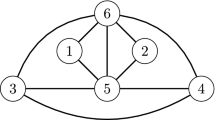Abstract
The “Collapsing 0–1 Knapsack Problem” is a type of non-linear knapsack problem in which the knapsack size is a non-increasing function of the number of items included.
An algorithm is developed and computational results included.
Similar content being viewed by others
References
E. Balas, “An additive algorithm for solving linear programs with zero–one variables”,Operations Research 13 (1965) 517–546.
G.B. Dantzig, “Discrete variable extremum problems”,Operations Research 5 (1957) 266–277.
R. Garfinkel and G. Nemhauser,Integer programming (J. Wiley, New York, 1972).
A. Geoffrion, “An improved implicit enumeration approach for integer programming”,Operations Research 17 (1969) 437–454.
L. Gilman and A. Rose,APL/360 an interactive approach (Wiley, New York, 1970).
H. Greenberg and R.L. Hegerish, “A branch search algorithm for the knapsack problem”,Management Science 16 (1970) 327–332.
M. Guignard and K. Spielberg, “Mixed-integer algorithms for the (0, 1) knapsack problem”,IBM Journal of Research & Development 16 (1972) 424–430.
P. Hammer and S. Rudeanu, “Pseudo-Boolean programming”,Operations Research 17 (1969) 233–261.
P. Hansen, “Algorithme pour les programmes non lineaires en variables zero—un”,Comptes Rendus 270 (1970) 1700–1702.
T.C. Hu,Integer programming and network flows (Addison Wesley, Reading, MA, 1969).
P. Huard, “Programmes mathematiques non lineaires a variables bivalentes”, in: H.W. Kuhn, ed.,Proceedings of the Princeton symposium on mathematical programming (Princeton University Press, 1970) 313–322.
G.P. Ingargiola and J.F. Korsh, “Reduction algorithm for zero–one single knapsack problems”,Management Science 20 (1973) 460–463.
P.J. Kolesar, “A branch and bound algorithm for the knapsack problem”,Management Science 13 (1967) 723–735.
E. Lawler and M. Bell, “A method for solving discrete optimization problems”,Operations Research 14 (1966) 1098–1112.
T.L. Morin and R.E. Marsten, “An algorithm for nonlinear knapsack problem”,Management Science 22 (1976) 1147–1158.
R.M. Nauss, “An efficient algorithm for the 0–1 knapsack problem”,Management Science 23 (1976) 27–31.
G. Plateau and D. Fayard, “Contribution a la resolution de probleme du knapsack: methodes d'exploration”, these presentee a l'universite des Sciences et Techniques de Lille obtenir le titre de Docteur de Specialite, 1971.
M. Posner, “The generalized knapsack problem”, Ph.D. Thesis, University of Pennsylvania (1974) 112–127.
H.M. Weingartner and D.N. Ness, “Methods for the solution of the multi-dimensional 0/1 knapsack problem”,Operations Research 15 (1967) 83–103.
Author information
Authors and Affiliations
Rights and permissions
About this article
Cite this article
Posner, M.E., Guignard, M. The Collapsing 0–1 Knapsack Problem. Mathematical Programming 15, 155–161 (1978). https://doi.org/10.1007/BF01609014
Received:
Revised:
Issue Date:
DOI: https://doi.org/10.1007/BF01609014




